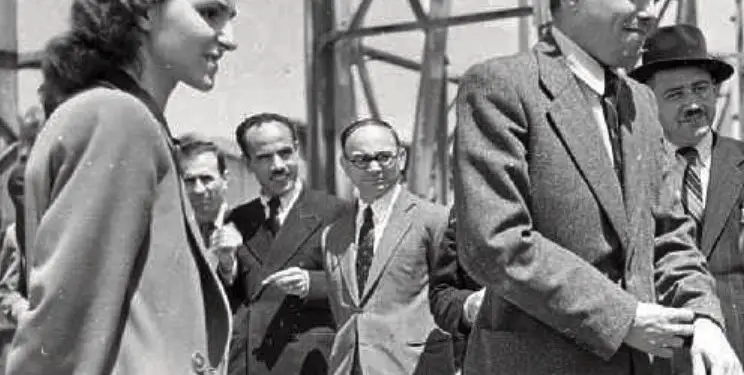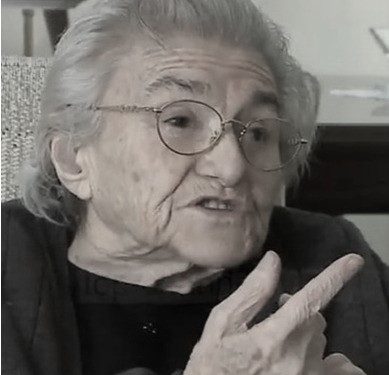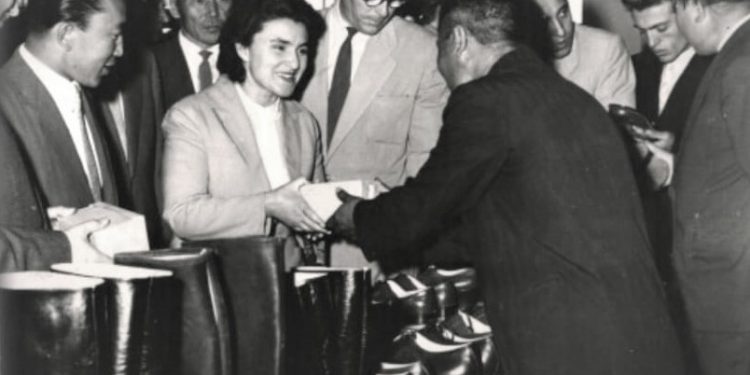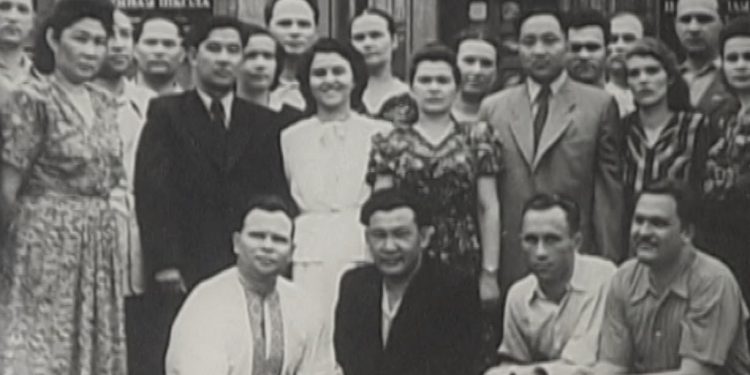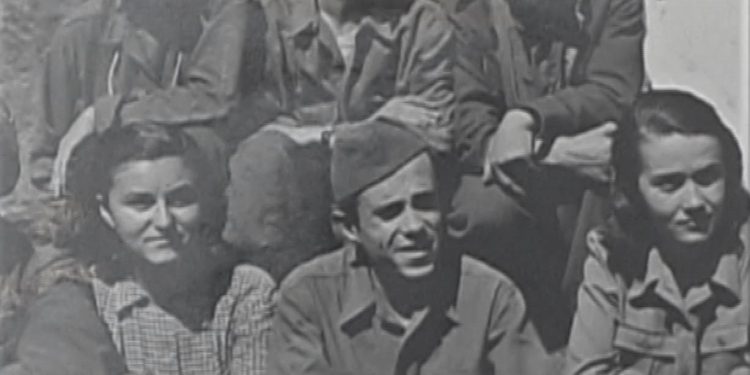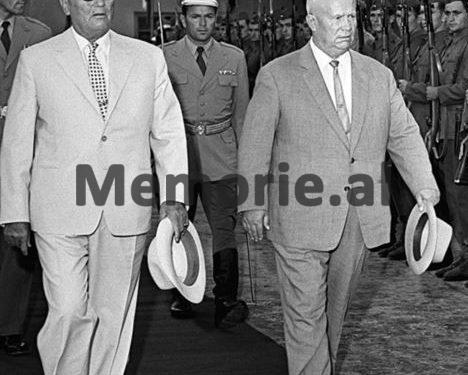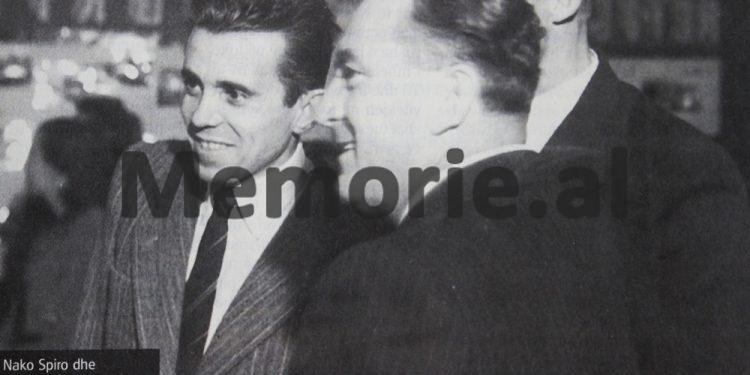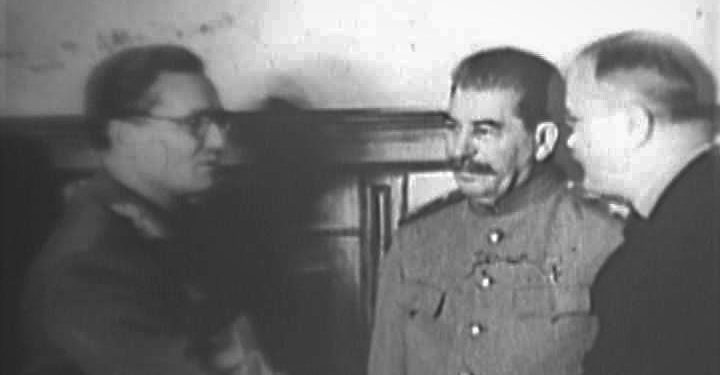By Elisabeta Ilnica
Second part
Memorie.al / She were only 16 years old, when she was accepted as a member of the Regional Committee of the Communist Youth of Tirana, that is, also of the Anti-Fascist Youth. While a year later, he was entrusted with the direction of all the youth of the capital. At the age of 18, she was elected a member of the Central Committee of the Communist Youth of Albania and soon after, she found herself in the Central Committee of the Communist Party. This was Liri Belishova, who lost her eye as a teenager in the War, while after the war, she lost the titles she received, and she lost her daughter Drita, but also two husbands, Nako Spiron and Maqo Çomon. She lost 31 years of her life in exile and many of her friends. Also educated in the former Soviet Union, one of the main exponents of the Anti-Fascist National Liberation War, a member of the Political Bureau and the Central Committee of the ALP, she was expelled in 1960 as an “enemy of the Party”, initially interned in Gjirokastër and then in Cërrik and Mallakastër, until 1991.
Continues from last issue
Ms. Belishova, do you think something would have changed in history if Enveri had asked for Kosovo?
Would Albania have united with Kosovo? However, even if the NPSH had followed a fair path towards Kosovo, it would not have been freed since then, it would not have joined Albania, as it was requested then. But the issue of Kosovo would have been raised; the file of Kosovo would have increased a lot, the awareness of the opinion in the Great Powers and in other European countries, would have increased about the issue of Kosovo. For this, the communist leaders have shown their wickedness, even Tito.
During the War, or rather it was the beginning, January 9, 1945 (if I’m not mistaken), when the war was still going on, and Yugoslavia had not yet been completely liberated, Tito sent a delegation to Moscow, to talk with Stalin, about two issues; first, weapons, clothing, etc., for the Yugoslav army, because that is how the Yugoslav partisans had returned to the army. And the second, the Yugoslav claims for the lands they were looking for, and you wonder what claims Tito had.
From the Hungarians, it requires two large regions, because they had coal mines. From Romania, he asked for some provinces that had a small part of Serbian inhabitants and said: if the Anglo-Americans will insist against this, at least the metallurgical plants and iron mines of these areas should be given to the ownership of Yugoslavia, those we need. From Greece, he was looking for Northern Greece, with Thessaloniki as its capital.
Stalin asks him: What about the Bulgarians? Tito replies: We have arranged it very well with the Bulgarians, but Dimitrov is spoiling our work, because we had also designated and arranged the meeting hall for the union of Bulgaria with us. Stalin tells him: Yes, Dimitrov is right; you are not asking for unification, you are asking to swallow Bulgaria, to make it a republic of the Yugoslav Federation. The head of the Yugoslav delegation says: Yes, it is their interest, because the Bulgarians, who were allies of Hitler, will suffer the sanctions of the defeated.
If they join us, they will escape these sanctions. Stalin continues: Yes with Albania. He answers: Aaaaaa, we are fine with Albania, we have agreed with our Albanian friends on all things. Albania is ours.
Then why didn’t they take us to the Federation, since they had agreed?
Yes, they actually took us, only that this work was not formulated “de jure”. And how vicious Stalin was and he still tells Tito’s, I think it was Milovan Gjilasi (Tito’s No. 2), he says to him: Don’t set foot in Albania with boots. I mean, don’t be harsh with Albanians. While when they were breaking down, Stalin, in order to get Tito better, said to Gjilas: More, what do you want, do you want to take Albania? Swallow it, we agree…!
But when it came to the work of the divisions, which he wanted to introduce, he said “no, the divisions should not go, you will get into a war with England and you cannot succeed in England”. That then the English were in Greece and the big ones had agreed that Albania should be an independent state.
Were Enver’s movements with Tito known then, did the Party comrades know these developments?
I remember it like now, once in those meetings of the Political Bureau, at that time when it was a break, Enveri, in order to get ahead of this, said: “There are letters that we wrote to Tito, but they were not written seriously, but to buy his mind”. Understand?! All politicians, it is difficult to find them with pure ideals. But Enver Hoxha, if you read his works, it is clear that he has put his throne above everything.
All those who opposed him, he ate their heads, shot them with bullets, or put them in prisons and exiles. As if everyone wanted Enver’s place, as if everyone was conspiring against Enver, no one had a view, no one had an idea. So this has preoccupied him, who is against me. That I wasn’t against Enver… (laughs).
Political Commissar of the General Staff of the National Liberation Army and then Commander-in-Chief of the National Liberation Army. Did Enver Hoxha really deserve these titles? Was Enver Hoxha really “so glorious” as a commander, as is said in some cases?
Being the General Secretary of the NPSH, according to the Yugoslav experience, because the truth is this, that the forms of organization that the Yugoslavs had, they were also made in Albania…!
They were duplicated, copied that is…?!
Yes, the Yugoslav Communist Party has always been copied. From this way of organization, Enver Hoxha was entitled. But was he really a warrior? (laughs). If you read Enver Hoxha’s memoirs, from his works, it turns out that he was on the mountain, in the Elbasan area, and watched with binoculars how his partisan comrades were fighting. Understand, this one was watching with binoculars, how they were shooting…?!
Do you know if Enver Hoxha ever shot?
The Second Plenum of Berat criticized Enver Hoxha a lot for not having a fair leadership during the War. During the War, however, I must say, that it was a partisan war, of an occupied country; it was very difficult to have a strong and focused leadership. But much more could have been done, if it wasn’t for Enver Hoxha, but someone else more capable and skilled, to do this work, the most sacrificial.
Then, keep in mind that the most difficult period of the Anti-Fascist National Liberation War was the winter of 1943-1944, when even the fate of many guilds, of many illegal organizations in the cities was endangered, Enver Hoxha himself admits this. During this time, Enver Hoxha did not lead the War, or the Party, or the illegal organizations, because he was surrounded in the Gramsh-Librazhd areas. So this whole period, so difficult, passed without the leadership of Enver Hoxha.
Is there any document or evidence that Enver Hoxha participated directly in any battle?
I do not know. Being a commander-in-chief, you are not judged by how much you have fought with a gun yourself, but nevertheless, the processing of plans, directives…! I am not one of those people who, I was in the General Staff, I was very young. When Albania was liberated, I had just turned 18 years old. I have worked with youth. And really, considering my age, I’m surprised now at how many responsibilities I’ve had.
I was 16 years old and a few months old, when I was made a member of the Regional Committee of the Communist Youth of Tirana, and thus of the Anti-Fascist Youth. I was a child. I was 17 years old and a few months old, when I led all the youth of Tirana. I was 18 years old, a member of the Central Committee of Communist Youth of Albania, the Secretariat of BRASH as it was called. I was 18 years old when I was introduced to the Central Committee of the Communist Party, that is, I had a lot of responsibilities, compared to my age. Although generally the ages have been young, but not to this degree like me.
If Enver Hoxha was not the president of the NPSH, who would be the best candidate to lead it? Who do you think?
There were communists, but from those who were both capable, intellectual, cultured, with integrity, and humane – I have known more myself, so I will say the first: there was Nako Spiro, Ymer Dishnica and Sejfulla Malëshova. Except for Qemal Stafa, who was killed quickly and very young, on May 5, 1942, a few months after the formation of the Party?
What about Qemal Stafa, did Enver Hoxha kill him?
I can’t say about Qemal Staffa.
While Nako Spiro committed suicide…?!
He killed these three I mentioned. For Nako Spiron, there is great responsibility that it was really the intrigues of the Yugoslavs, because he opposed their plans to unite Albania with Yugoslavia. He was the Minister of Economy and the war took place precisely in the economic war. But both Ymer Dishnica and Sejfulla Malëshova were people of integrity, genuine intellectuals. That’s why when they say, for example, “Enver Hoxha, the great erudite” and others, I don’t think these are fair definitions, that you can’t compare him with European figures, but also with his fellow communists.
It remained a bit unclear; do you think that Enver eliminated Nako as well?
Hear what Enver’s responsibility is like. The Yugoslavs were the ones who wanted to eliminate Nako, because he was an obstacle, because the whole war was taking place in the economic field. That they wanted Albania to submit to Yugoslavia; common plans, common prices, unified money, removal of customs, etc. But the Yugoslavs could not liquidate Nako.
Who did they liquidate it with?
They liquidated it with the approval of Enver Hoxha. That it was Enver Hoxha when the Yugoslav accusations came, who accused Nako of acting as an enemy, as an agent of imperialism, who not only did not reject these accusations, that they were absurd, but presented them to the Political Bureau. Enveri has opened the meeting of the Bureau. They are the minutes. And Enveri has the responsibility that. The Bureau developed on that path.
Ramiz Alia says: “Enver Hoxha had nothing to do”. He had something to do, because in the Political Bureau of that time, only 3 people were the people of the Yugoslavs, Koçi Xoxe, Kristo Themelko and Pandi Kristo, who would approve what the Yugoslavs would say. All the others were with Enver, they would support Enver and these were the majority of 6 people: Gogo Nushi, Hysni Kapo, etc.
Then Enver Hoxha also did this that he did not ask for the help of the Soviets. At that time, we, the ‘mother party’, had the Soviet Union, our “Jerusalem” was Moscow. He should go and look for the Soviet ambassador and tell him: The Yugoslavs have sent us this letter, dear, they didn’t hand over the letter so as not to leave documents, but they told him orally. To tell him that; Nako Spiro is not an enemy, but he has defended the interests of the Albanian state and defended them on the basis of Marxism-Leninism.
But Enveri, on the day that Nako Spiro, as they say: “killed himself”, because he gave this version, called the charge d’affaires of the Soviet Union, that the ambassador was not here, but in Moscow, and told him: “Many mistakes have been made in relations with Yugoslavia, which have damaged Albania’s friendship with Yugoslavia and the main responsibility for this lies with Nako Spiro. The Yugoslav comrades have presented this matter to us and we are discussing it in the Political Bureau, we will criticize it and take measures for Nako Spiro”.
He did not tell him that; I do not agree with these. He did not ask for help, but said we will take measures. It is the document, the report that this Soviet made to his center, that Enver Hoxha called me and told me so and so. When Nako Spiro came to Enver Hoxha, he did not receive him. The other days he had waited, but after Enver Hoxha said this, he didn’t wait. But Nako didn’t know this, neither did I. And Nako returned home and said: “There is no other way but to take it from myself, because Enver Hoxha closed my door and the Soviet Embassy closed my door.”
Are you saying that they pushed him towards this act?
But who would protect Nako…?!
What did Enver Hoxha say after this event?
Enver Hoxha condemned Nako, they called him an enemy, a special plenum was held, the eighth plenum; Nako was convicted, I, Fadil Paçrami, was convicted; we were expelled from the Central Committee and the Party. Meanwhile, Mehmet Shehu was criticized and kept as minister, as it seems Enveri had in mind the fame that Mehmet had gained during the War and did not want to be harsh.
Since you mentioned Mehmet Shehu, what do you think about him?
Mehmet Shehu was a tough man. I can even say, a wild man, and perhaps the experience of the Spanish war has influenced this. Because even there the Spanish communists had a lot of extremism, a lot of sectarianism, but also his nature as a person. But contrary to Enver Hoxha, Mehmeti had some sides that make him a more positive figure than him, if the word “positive” can be used.
The first, Mehmet Shehu fought, not only in the Spanish War, but also in Albania; in Mallakastër, then commander of the First Brigade, then of the First Division, etc., so he was face to face with the enemy, he fought. Mehmet Shehu also had this good thing that he was a good organizer, that Enver Hoxha talked, talked, talked, but Mehmet Shehu did the work, especially in those 37 years that he was prime minister.
There was also this side, what he thought, he would say in his eyes and with extreme conclusions, when they told him: you are a deviant; you are a Trotskyist, etc. He had that word “Trotskyist” on the tip of his tongue and I, after finishing high school in Moscow, told him: More Mehmet, Trotsky, he was a leftist extremist.
You say “you are an opportunist, you are a Trotskyist”. Right-wing opportunist, it was Bukharin, not Trotsky. “Ohhhh, leave it alone now,” Mehmeti said (laughs). He didn’t want to be contradicted, he said: “This one went to school, because this one is the most ladylike of me.” I didn’t even pretend to be his mistress, but I had learned these things.
What about Mehmet, do you think the same as about Nako’s case, regarding murder or suicide?
It is so impossible to explain these things in the system of the dictatorship of the proletariat, especially when so many years have passed. But I said about Nako Spiro and this applies to all those who killed themselves: “There is no suicide, there is only murder.” That when you put a man in such a position that he says “death is better”, then you have killed him. And killing yourself is not easy!
It is extremely difficult and I have tried this on my skin; I couldn’t kill myself. Logically I should have killed her, because what I took away was extremely unbearable for a human being, for a young woman. I didn’t kill him though. I even faced what a mother can’t face, it’s terrible, to face the death of the daughter who didn’t live a day as a human, an hour as a human…!
In the fight against the invaders, there were also other political forces, such as legalists, ballistas or other organizations. Why did communism win and these lost?
Indeed, as far as I am aware, there is no scientific analysis on this issue. Because, from what Enver Hoxha wrote or the historians of that time, you can get elements of the truth, but not the complete truth. Because there has been a great deal of ideologization and there has been a great submission of everything to the personal interests of Enver Hoxha. While in these years, I have not read anything serious. I also have a certain opinion.
What can be called the “pariah of Albania”, of the time of the Kingdom of Zogu, i.e., those who were Albanian politicians, statesmen, Albanian intellectuals, those who had wealth in their hands, the most educated people, proved incapable of the direction of the Albanian state? Not doing an analysis of Ahmet Zogu, but taking his foreign policy, has this man made all possible efforts to provide Albania with support, because Albania was a very small, very weak country, very poor
While Albania’s neighbors, Greece, Serbia or Yugoslavia that was then, Italy, did not hide their claims towards Albania at all. Albania was endangered, they looked at Albania as a property, how it would be divided between them and the biggest part would be taken by the one who would be stronger and smarter, so to speak. The fact is that Albania happened without any support, without any allies, before the fascist aggression.
Ok, but why did communism win…?!
Albania was occupied. What did this “first” do? Very few escaped with Ahmet Zogu. Those who remained some accepted the Italian occupation and collaborated with it. Among them, there were also people who tried to secure some advantages for the Albanian people, of Albania and Kosovo, within this invasion. For example, in the field of education, etc. But even those who were anti-fascists did not show themselves capable of organizing. The first political party was the Communist Party.
The first initiative to unite Albanians in the war against the occupier was that of the KPSH, which called the Peza Conference. Why should the NPSH call this Conference, let the patriots and nationalists call it. Even boycotting this Conference does not seem to me to have been appropriate. They came and took the lead there, because these were the majority. The Communist Party was highly motivated for war.
The first order of business was the issue that was being fought for life or death, between socialism and Nazism. In addition, they, seeing the weakness of the Albanian “pariah”, called it possible for Albania to use this war to become the hegemon of the war and to establish its power, which we imagined to be very democratic, because it would come the working class that did not exist would come into power, the workers’ masses would come, the people would come, there would be freedom-democracy (laughs). Memorie.al
The next issue follows




